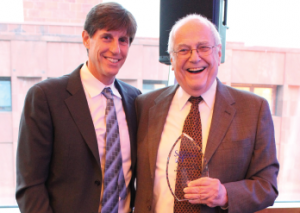
Ulf Wittrock / shutterstock.com
When Harry Spiera, MD, stepped out of the New York University School of Medicine in 1958, rheumatology was in its infancy. Obviously, much has changed for both the physician and the specialty over the 58 years between then and his recent retirement.
“Early on, rheumatology was the most clinical of the specialties, because the science just wasn’t there yet,” says Dr. Spiera. “At that time, we were just starting to look at the rheumatic diseases in a serious and systematic way. That fascinated me.”
Over the years, research has made great strides in identifying rheumatic diseases and, at least as importantly, their treatment. When he began his career, rheumatoid arthritis (RA) was almost always a crippling and debilitating disease. Now, it is possible to stabilize patients and stop the progression of the disease.
“Rheumatology is not just a job, it is a part of who he is,” says Robert Spiera, MD, of his father. Dr. Robert Speira is Harry’s son and the director of the Scleroderma and Vasculitis Center at the Hospital for Special Surgery in New York City. “He suffered with this patients, he had joy with his patients, and recognized that any interaction you have with a patient is deeply important to them and their families.”
Groundbreaking Work in PMR

Father and son: Harry Spiera, MD (right), with Robert Spiera, MD (left).
Dr. Harry Spiera contributed to the advancement of science of rheumatologic diseases via his groundbreaking work in polymyalgia rheumatica (PMR). Criteria had been established for diagnosing other illnesses, but he noted a subset of elderly patients who appeared to be in good health who suddenly complained of stiffness and pain in the shoulder and hips.
PMR affects 1% of those over 50 at some time in their lives. Before Dr. Spiera published his series on multiple American patients in the 1960s, the only other work in the field had been a few cases studies in Europe.
That first series of 15 patients has, over the years, led to PMR becoming a well understood and accepted disease. He calls it “the most interesting and clinically satisfying part of my career.”
“It was his skill as a hands-on clinician who was in the room and really listening to the patient that helped lead to the recognition of PMR as an important inflammatory condition of the elderly,” says Dr. Robert Spiera. “He saw people coming to him with pain, but with a different quality than usual. His ability to listen enabled him to realize he was looking at something that hadn’t been previously described.”


